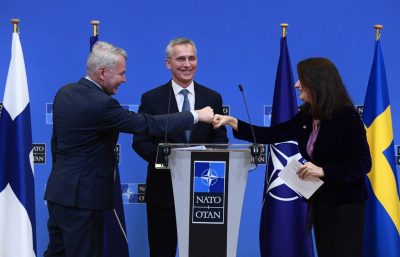Sweden and Finland Hastily Preparing to Join NATO

All Global Research articles can be read in 51 languages by activating the “Translate Website” drop down menu on the top banner of our home page (Desktop version).
To receive Global Research’s Daily Newsletter (selected articles), click here.
Visit and follow us on Instagram, Twitter and Facebook. Feel free to repost and share widely Global Research articles.
***
It seems that, in fact, despite all the warnings issued by geopolitical experts, Sweden and Finland are planning to go ahead with an application for membership in NATO. This would be a serious strategic mistake, as it would make both countries hostile to Russia, severely damaging the stability of local international relations on the European continent. There is still time for Swedish and Finnish decision-makers to reverse this scenario, but it remains to be seen whether defending the national interests of their own countries is really a priority for them.
Finland and Sweden will jointly express their desire to join NATO in May, reported on April 25, the newspapers “Iltalehti” in Finland and “Expressen” in Sweden, citing sources allegedly close to the officials who decide on the matter. According to Iltalehti, the leaders of Finland and Sweden plan to meet in the week of May 16 and then publicly announce their plans to apply to join the Western military alliance.
Furthermore, the Swedish Aftonbladet claimed, citing sources possibly inside the Swedish government offices, that
“The Government has received information from the US and the UK, in particular, on what protection and support might look like during a possible application process… This includes strong political support from NATO countries, in-depth exercises, the expansion of NATO’s presence in the Baltic Sea region, in-depth intelligence cooperation and expert support to identify and counter hybrid, cyber and conventional threats”.
The Swedish and Finnish politicians refused to respond to the news, maintaining provisional confidentiality on the case, given the strategic and delicate content of the matter. However, in previous situations, interest in the application had already been shown. Finland’s Prime Minister Sanna Marin said a few days ago, while visiting her Swedish counterpart Magdalena Andersson, that she expected Finland to make its decision to apply for NATO membership within weeks, for example.
Furthermore, on the part of the Swedes, it is important to remember that a broad reform of Stockholm’s defense policy is currently underway in order to reverse the country’s historic pacifism and formulate the bases for a new national military ideology, in which NATO will possibly have some degree of participation.
While the possible adhesion is discussed internally and the media speculates the most likely outcome, some steps further in cooperation are already being taken. The Finnish Navy has announced the start of a series of joint military exercises with NATO, to be held between 28 and 29 April. Fleets from six countries are participating in the drills, which are taking place on the Archipelago Sea, which is part of the Baltic Sea surrounded by the Gulf of Bothnia, the Gulf of Finland, and the Sea of Aland, within Finnish territorial waters. The step is important and truly symptomatic, indicating that regardless of the outcome of the membership discussion, relations between NATO and the Scandinavian countries will inevitably increase.
In fact, it seems quite evident that for any country with historical neutrality, faced with a conflict in its neighborhood, the best thing to do is precisely to remain neutral. If the disputed interests in the international conflicts around Sweden and Finland do not concern the Scandinavian world, but the delimitation of the Russian and Western strategic environments, the only rational solution seems to be simply to preserve historical pacifism and abdicate from joining either side.
The problem, however, is that the Scandinavian countries seem to be heavily affected by Western anti-Russian paranoia and now fear that the conflict in Ukraine is the start of some sort of “indiscriminate war” by Russia against all European countries. The Swedish and Finnish governments themselves, which should have a rational and strategic stance in the face of geopolitical events, seem to act irrationally, adhering to unsubstantiated accusations and meaningless fears implemented by Western media agencies.
This argument is also supported by Erkki Tuomioja himself – a major name in Finnish political scenario, who has served as a foreign minister under several governments and remains a political influencer in Finland. He believes his country is in a state of “war psychosis”: “Public opinion plays a big role in this, but there is also this ingrained fear, which is actually fueled by our media, which is in a state of war psychosis (…)”. He is also against NATO membership: “[Joning NATO will damage the] very pragmatic relationship in terms of logistics, environment and regional cooperation between Russian and Finland (…)”. However, he fears the impact of the war psychosis on public debate: “I’m also concerned about the level of the public debate. Anybody who questions membership is being vilified as a Putin agent”.
Faced with this scenario, the issue seems simple for Scandinavian countries: defend strategic interests and cooperate for stability in Europe or join paranoias, assuming a hostile posture towards Russia and harming continental peace. It is a choice to be made.
*
Note to readers: Please click the share buttons above or below. Follow us on Instagram, Twitter and Facebook. Feel free to repost and share widely Global Research articles.
Lucas Leiroz is a researcher in Social Sciences at the Rural Federal University of Rio de Janeiro; geopolitical consultant.
Featured image is from InfoBrics

